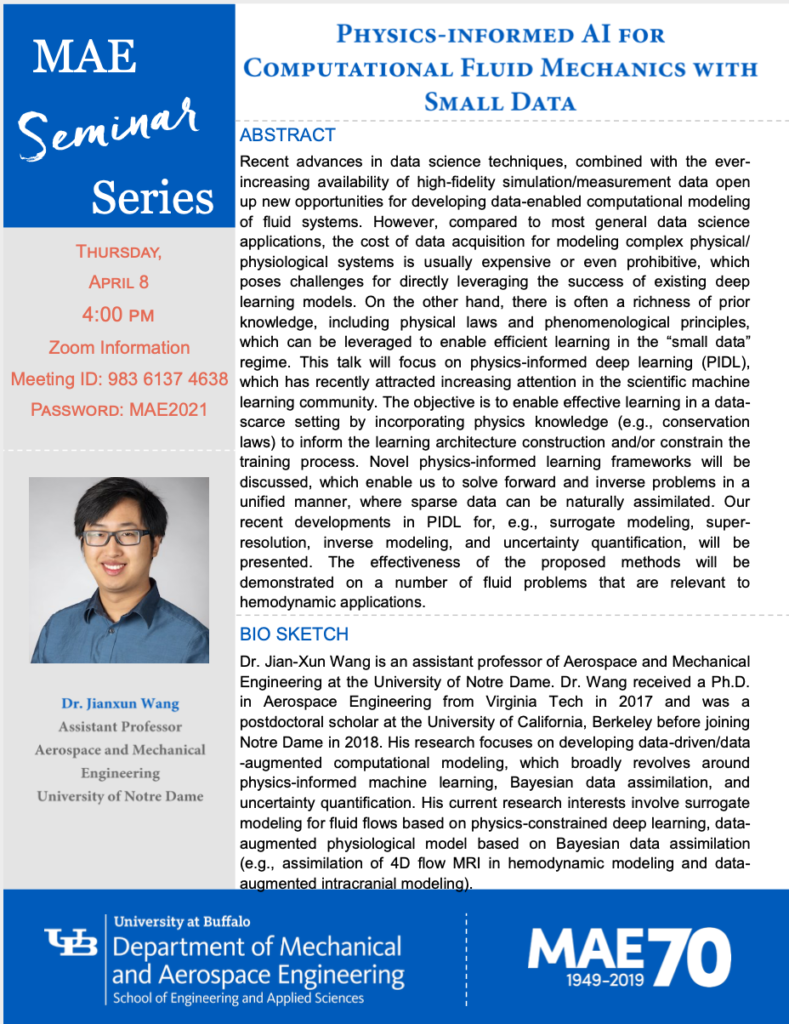Pan Du won poster award @ Fall Symposium of Lucy Institute of Data Science and Society. Congrats! The Mayor of South Bend presented the award.

Pan Du won poster award @ Fall Symposium of Lucy Institute of Data Science and Society. Congrats! The Mayor of South Bend presented the award.


Together with Danial, Kathryn, Alireza, and Hao, we will co-host a mini-sympoisum entiled Physics-Informed Learning and Data-Enabled Predictive Modeling and Discovery of Complex Systems, where 15 speakers will give excellent talks on scientific machine learning and data-driven predictive modeling. (10:00-18:00 (UTC), 07/26/2021). Please check out.
Our group will also give 3 talks at USNCCM:

Together with Prof. Huan Xun@University of Michigan, we will host a two-section mini-symposium (MS48) entiled: Physics-aware machine learning for solving and discovering PDEs, part I (MS48) and part II (MS105)
Part I (MS 48), Tuesday, July 20
 Victor Churchill, Dartmouth College, U.S.; Kailiang Wu and Dongbin Xiu, Ohio State University, U.S.
Victor Churchill, Dartmouth College, U.S.; Kailiang Wu and Dongbin Xiu, Ohio State University, U.S.  Xinyang Liu and Jianxun Wang, University of Notre Dame, U.S.
Xinyang Liu and Jianxun Wang, University of Notre Dame, U.S.Part II (MS 105), Friday, July 23
 Xun Huan, University of Michigan, U.S.
Xun Huan, University of Michigan, U.S.  Pu Ren and Chengping Rao, Northeastern University, U.S.; Jianxun Wang, University of Notre Dame, U.S.; Yang Liu and Hao Sun, Northeastern University, U.S.
Pu Ren and Chengping Rao, Northeastern University, U.S.; Jianxun Wang, University of Notre Dame, U.S.; Yang Liu and Hao Sun, Northeastern University, U.S. Congrats to Pan Du on his first publication in PLoS One





I will organize a mini-symposium entitled “Physics Informed Learning for Modeling and Discovery of Complex Systems” Parts I and II on 03/03/2021 at SIAM CSE. Moreover, our group will also give several talks at CSE21.
MS Talk: Wang et al. Physics-Informed Discretization-Based Learning: a Unified Framework for Solving PDE-Constrained Forward and Inverse Problem (2:15-2:30 CST, 03/03/2021) https://meetings.siam.org/sess/dsp_talk.cfm?p=108358
MS Talk: Han et al. Suppreresolution and Denoising of Flow Imaging using Physics-Constrained Discrete Learning (4:35-4:50 CST, 03/01/2021) https://meetings.siam.org/sess/dsp_talk.cfm?p=108020
MS Talk: Sun et al. System Identification by Sparse Bayesian Learinng (5:35-5:50 CST, 03/04/2021) https://meetings.siam.org/sess/dsp_talk.cfm?p=108437
Poster: Pan et al. Patient-Specific CFD Modeling of Aortic Dissection Augmented with 4D Flow MRI https://meetings.siam.org/sess/dsp_talk.cfm?p=110813